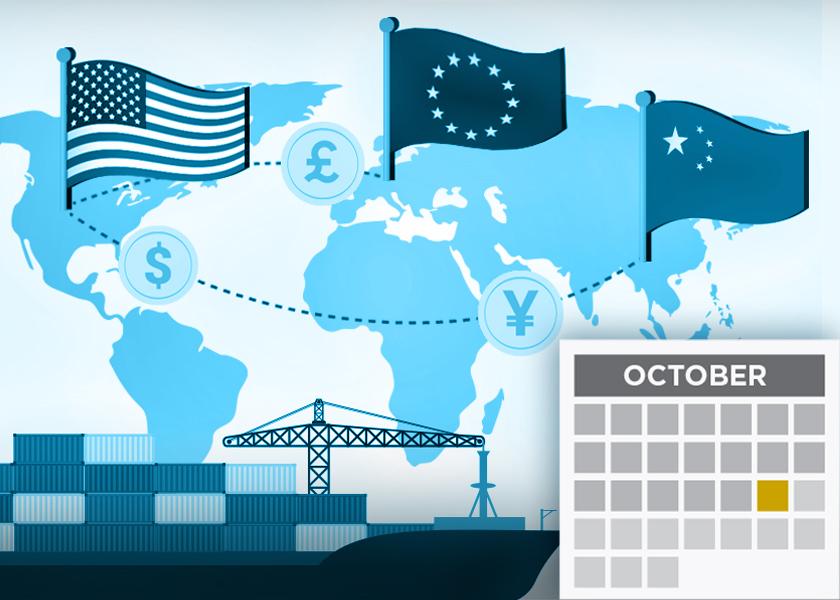The U.S. And Europe Are At Odds Over Trump-Era Tariffs, And It's Now Causing Strained Relations

The U.S. and Europe are preparing for a one-day summit this week. On the agenda is the continued tiff over Trump-era tariffs, and the outcome of those talks could impact more than just trade, as there are now geopolitical implications both countries must weigh.
President Biden will host European Commission chief Ursula von der Leyen, along with European Council head Charles Michel, on Friday. It's a one-day summit that is aimed to show transatlantic unity toward Ukraine, but economic topics are also on the agenda, including discussing tariffs.
The U.S. and Europe are at odds over Trump-era tariffs, straining trans-Atlantic relations, according to a report from the Wall Street Journal. Former President Donald Trump imposed tariffs on U.S. steel and aluminum imports in 2018, sparking tensions with U.S. allies and retaliatory measures.
While the U.S. and EU aim to make progress during an upcoming summit, reaching a final agreement is uncertain, the WSJ article notes, potentially extending the tariff dispute into the next presidential election. This issue has significant implications for U.S./EU ties, climate goals, and geopolitics.
The Biden administration initially allowed European steel and aluminum imports into the U.S. without tariffs, as long as import volumes remained below historical levels, signaling an attempt to reset the relationship after tense years under the Trump administration. This move also led the EU to suspend its retaliatory tariffs on various U.S. products. However, economic tensions flared up again, driven by provisions linked to clean-technology subsidies in the U.S. Inflation Reduction Act (Climate Bill). This resulted in some European companies considering shifting investments to the U.S. Some European politicians also accused the U.S. of taking advantage of European energy shortages related to the Ukraine conflict by charging high prices for liquefied natural gas, raising industrial costs.
In the current negotiations, the U.S. is seeking EU tariffs on Chinese steel, which it believes contributes to global oversupply and harms U.S. producers. Simultaneously, the U.S. is hesitant to completely remove tariffs on European metals and instead seeks commitments from the EU to impose tariffs on Chinese steel in exchange for maintaining the suspension of tariffs on European imports.
The EU's position is that it seeks a definitive end to U.S. tariffs and insists that any trade measures must comply with World Trade Organization rules.
EU officials have expressed willingness to pursue an anti-subsidy investigation into steel originating from non-market economies, but they have resisted Washington's push for specific actions against Chinese products, citing WTO rules. The WSJ article says the EU is reportedly planning to announce such an investigation targeting steel during the upcoming summit (Friday, Oct. 20), potentially using it as leverage in negotiations with the United States.
Bottom line: The outcome of the negotiations will not only impact trade relations, but also have broader geopolitical implications.
More Tariffs Planned for China
The Biden administration is planning to announce new controls on artificial intelligence chips and equipment that can be sold to China, administration officials told Axios (link). The new restrictions, likely to be announced early this week, will broaden a White House effort to prevent China from gaining a military advantage in artificial intelligence.
The controls will also limit the export of equipment used to produce advanced semiconductors, bringing the U.S. into line with regulations imposed by Japan and the Netherlands.







